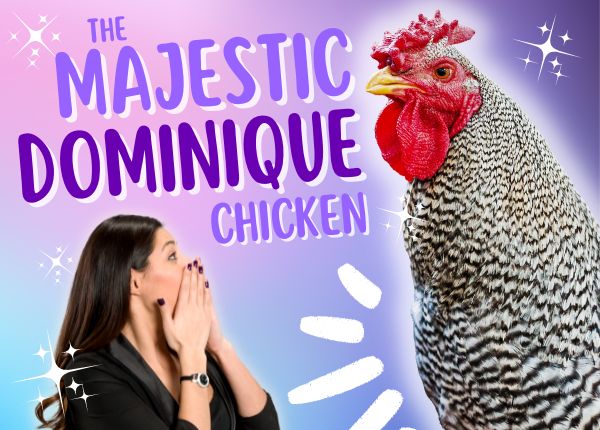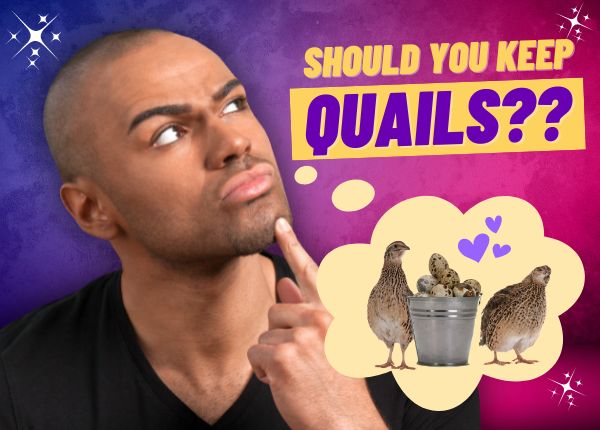
In a hurry? Morning time mayhem at home? Let’s hop straight to it:
To check if an egg is safe to eat place it in water. If it floats to the top don’t eat it.
Now, let me egg-spand…
Fresh eggs don’t fall out of hens conveniently stamped with a use-by date. We chicken keepers need to decide for ourselves whether an egg is fresh or not.
If you’ve bagged an egg straight from under Bettie’s butt, then you can confidently crack on with that quiche recipe knowing that you have a fabulously fresh egg.
We all have moments when we’re not sure if an egg is good or not. Ever questioned your storage system and been left pondering how long an egg has been sitting in the fridge door for? Or - like me – have you discovered a secret stash behind the shed and have diddly-squat idea how long your sneaky little ladies have been hiding them from you? We’ve all been there.
Even when we buy our eggs at the store, there’s always the odd trash can grapple of shame: hunting for an illusive egg carton in the hope of checking the date. They’re never there! Where do they go?
They say “if in doubt throw it out”. How many good eggs are going to waste because of that doubt though? I'm about to share six easy ways to check if an egg is fresh – no skill or fancy equipment required!
You can use your eyes, your nose, and even your ears to estimate an egg’s age. You can use your sense of taste too, but we’d rather not take it that far!
Feel like your hens are giving you the evils as you trash an unused egg?
They probably are!
Polly pushed so you could poach it, not trash it!
Keeping chickens for their eggs 🥚 is all about enjoying a sustainable lifestyle. Making the right decisions around the chicken you keep, and their coop, catering, and care will keep costs down and productivity high.
On average an emergency vet call-out costs $250, so knowing how to prevent poultry problems can save you a feathery fortune, not to mention saving you the worry and heartache of a poorly hen. Investing in your chicken-keeping skills is much more sensible than treating them to a fancy three-tier coop. Chickenpedia’s chicken-keeping courses offer an easy, affordable, and dependable source of information to help you make the most of your chicken-keeping venture with less expense, more eggs, and more fun!
How Long Do Eggs Last?
Freshly laid eggs will last for at least 2-4 weeks at room temperature, up to 6 months in the refrigerator, and up to 12 months in the freezer. These are only estimates though. Eggs don’t suddenly decompose when the clock strikes midnight on the 14th day.
Egg-sactly how long your yolks stay yummy depends on how you prepare and store them. Find out how to store your eggs and keep them fresh for longer and read on for five easy freshness tests that anyone can do.

Are Use-By Dates on Eggs Reliable?
I’m delighted we haven’t bred a bird who date stamps her own eggs yet. The use-by date on store-bought eggs is a handy guide, but they’re often over-cautious, resulting in waste. Also, not every egg stays fresh until the date on its’ shell.
As my Nan rightly reminded me (constantly): “You didn’t used to get dates on food. You would decide for yourself when it was bad”.
Wasting a good store-bought egg is one thing, but after all the hard work and passion that you and your girls have put into those home-laid eggs, chucking a perfectly good one in the trash just because ‘it’s day number 14’ is madness!
FIVE WAYS TO CHECK YOUR EGGS FOR FRESHNESS
NO MORE WASTAGE!

1. THE SINK OR FLOAT TEST
What is the sink or float test?
When you place an egg in water, older eggs float more. This makes for a quick and easy assessment of how old an egg is and helps us decide whether it’s good to eat or not.

Why do bad eggs float?
Egg shells are porous so that baby chicks can breathe, and as eggs age, the shell gets more porous allowing moisture from inside to evaporate. When that happens, the air cell inside the egg grows larger to fill the space. The older the egg, the more it floats, meaning you can use buoyancy to estimate the age of an egg.
- If the egg lays horizontally at the bottom of the bowl or glass, then it’s fresh as a daisy.
- If just the pointy end lifts off the base on an angle, then it’s about a week old. It’s safe to eat, and perfect for making meringue!
- If the pointy end lifts all the way so your egg is sitting upright, then it's around 3 weeks old. It’s past its best but safe to eat and perfect for hard boiling!
- If your egg bobs around mid-water, then it’s on its way out.
- If an egg floats to the top, it's stale and not safe to eat.
Do you need salt in the float or sink test?
You don’t need to use salty water for the float test but adding a teaspoon of salt 🧂 per glass of water will make an egg more buoyant. This means your egg will simply float or sink – no grey areas! If you want to play it safe, just add salt.
How reliable is the sink or float test?
The sink or float test isn’t 100% reliable. But then, neither are use-by dates. You can almost bank on an older egg floating and a fresh egg sinking, but there’s always a chance a fresh egg could float for some reason other than age. Some keepers say that warm eggs fresh from the nesting box tend to float.
I use the sink or float test to rule out ‘floaters’ but then proceed to crack and sniff!
2. THE SNIFF TEST
Why do rotten eggs smell?
You should certainly trust your nose when it comes to eggs. Rotten eggs smell of – well - rotten eggs. It’s a very distinctive and utterly disgusting smell.
Eggs have high levels of two proteins: keratin and globulin. It’s the globlin, in particular, that releases hydrogen sulfide when it begins to decay, which has that unmistakable stink.
Eggs that are well into the process of decay will stink as soon as you open the fridge door, but those that have just begun to decay might shock your snout once you crack them open.
If you suspect an egg might be off don’t hard-boil it: crack it open, sniff, and look!
3. THE EGG WHITE TEST

The egg white test determines if an egg is good or bad using your eyes.
Crack the egg in question into a bowl (not straight into the mix or pan) and take a good cluck.
The white should only be white. Anything else isn’t right! Fresh eggs have thick and slightly opaque whites which should hold their puddle shape quite well in the bowl.
Older eggs have runnier whites which spread more in the bowl. It doesn’t make them unsafe to eat, but it’s another sign of an egg's age.
Yolks can tell you a lot too. If the yolks are round and domed, the eggs are still very fresh, but if they look flattened, they may be on the older side. A flat yolk is perfectly safe to eat, but any color other than yellow or orange is no yolk. Chuck it out.
Are cloudy egg whites safe to eat?
Cloudy-looking egg whites are safe to eat – perhaps even safer than clear ones! Cloudy whites are caused by high levels of carbon dioxide which indicate they’re freshly laid and so safe to eat. That cloudiness clears over time, so cloudy eggs are fresher than clear ones.
4. LISTEN UP CHUCK!
Can you hear if an egg has gone bad?
Older eggs do sound different from fresh eggs when you shake them. It’s all about that air sack again. If you gently shake an egg and listen to it, the larger air sack of an older egg will let the white and yolk slosh around. A sloshy egg is a bad sign.
5. EGG CANDLING
Can you use candling to tell if an egg is off?

Candling is used mainly to check if an egg is fertile but can also be used to check if an egg is good to eat.
This is 2022. You don’t have to find a candle. A mobile phone torch will do the trick! You can use a standard torch or even buy candling stations, but chances are you won’t need one often enough to warrant the spend.
First, shine a bright light onto the shell in a dark room and check for any fine cracks in the shell. Cracks create a gateway for bacteria to enter the egg, so are risky.
Hold the egg upright (skinny end up) with the torch touching the base. If the content of the egg doesn’t fill it and touch the sides, then the air sack is large, and the egg is older.
Are older eggs safe to eat?
So, you’ve added five ways to check if an egg is fresh to your Chicken-keeping skills. Nice work.
Queue the next worry…“It’s not floating or stinky, but it’s not exactly fresh, either. Is that okay?”
Fresh eggs taste best poached, fried, and scrambled, but older eggs are still safe to eat. Did you know that eggs can last for months on the counter if you don’t wash them, or that chefs prefer slightly older eggs for hard boiling and certain recipes?
“Don't toss your eggs just because they're close to expiring. Older eggs are actually great for making meringue—they whip up better than fresh eggs. You can also hard-boil older eggs to extend their shelf-life for a little longer. Hard-boiled eggs can be stored in their shells in the fridge for another week…Then use your hard-boiled to make egg salad or deviled eggs.” (The Pioneer Woman)
HOW DO YOU TEST YOURS?
Share your favorite freshness tips with the class here!
I’m glad you decided to read up on reducing wastage. It’s not just your little coop buddies and your bank balance who will thank you. The USDA (United States Department of Agriculture) estimates that 30-40% of the country’s annual food supply is wasted. Bonkers. But now you’re doing your bit!
So, you’re testing your eggs? Why not test yourself?
Just how chicken savvy are you…honestly?
Confident you know all the common chicken illnesses and how to spot them early? Do you know your frazzles from your sazzles, or which chicken breeds lay best? Is it safe for your rooster to share his wife’s layer food? Why should you put Apple Cider vinegar in your chicken’s water?
If you don’t have all the answers yet, you soon will! The experts atChickenpedia have lovingly pieced together the perfect selection of chicken-keeping courses suitable for beginners and experienced chicken lovers. With unlimited access to guidance, advice, and all the chicken-chat your heart desires, you’ll soon be the master of your chicken-keeping adventures.











Leave a comment (all fields required)